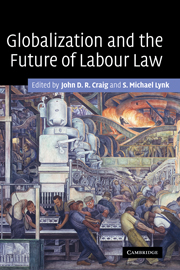Book contents
- Frontmatter
- Contents
- Notes on contributors
- Acknowledgements
- Table of cases
- List of abbreviations
- Introduction
- PART I Perspectives on globalization
- 1 The international labour dimension: an introduction
- 2 Who's afraid of globalization? Reflections on the future of labour law
- PART II International labour standards
- PART III The European Union
- PART IV The Americas
- PART V The ILO
- PART VI Labour rights
- Bibliography
- Index
2 - Who's afraid of globalization? Reflections on the future of labour law
Published online by Cambridge University Press: 23 July 2009
- Frontmatter
- Contents
- Notes on contributors
- Acknowledgements
- Table of cases
- List of abbreviations
- Introduction
- PART I Perspectives on globalization
- 1 The international labour dimension: an introduction
- 2 Who's afraid of globalization? Reflections on the future of labour law
- PART II International labour standards
- PART III The European Union
- PART IV The Americas
- PART V The ILO
- PART VI Labour rights
- Bibliography
- Index
Summary
Introduction
My challenge in this paper can be summed up by the following question: “Who's afraid of globalization?” My short answer is “just about everyone, if they have any sense”: CEOs of companies, small business people, local executives of branch plants, fundraisers for charities, practising professionals in law, epidemiology, advertising and finance – and, of course, workers and unions. In fact, since I am being autobiographical, add to my list of fearful Canadians at least one labour law professor. However, like many other people, my own feelings about globalization are mixed. It has turned much of my world upside down, but at the same time, it has provided me with ten years of interesting work.
My common sense assumptions about globalization and labour law – and why they had to be revised
My work on globalization and labour law began with what seemed like common sense assumptions: that globalization was reshaping the economies of almost all countries, albeit in different ways; that to govern this new economic order, a new transnational legal system would surely emerge; that this new transnational legal system would somehow reproduce at the international level the institutions and processes of our domestic systems of labour law; that en route to this transnational system, employers would likely enjoy significant but time-limited advantages; but that ultimately, transnational labour law – global labour law – would reach the standard we have set for our domestic systems: it would ensure a decent level of social justice for workers and social peace for employers.
- Type
- Chapter
- Information
- Globalization and the Future of Labour Law , pp. 51 - 74Publisher: Cambridge University PressPrint publication year: 2006
- 15
- Cited by

